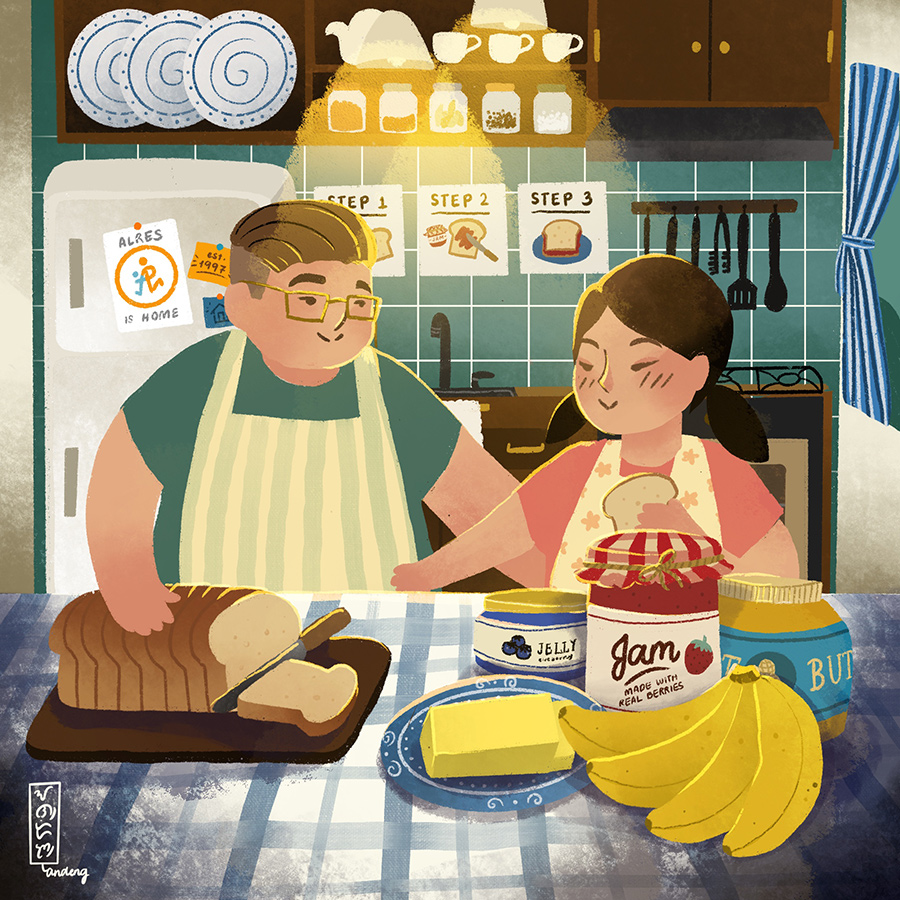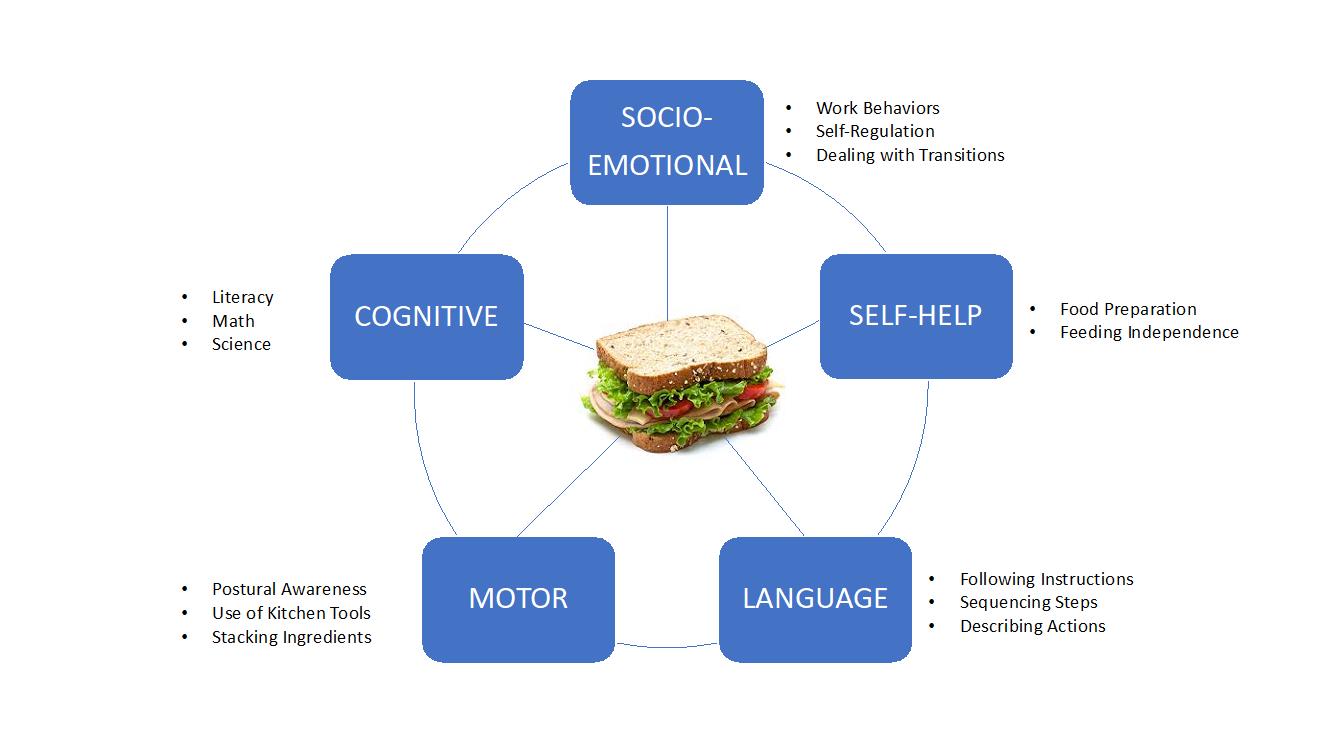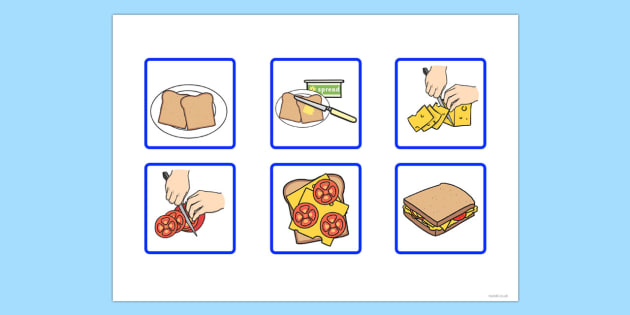Therapy in a Sandwich

Making a sandwich may seem to be the simplest thing to do, but has your child ever experienced preparing one himself? This is a life skill that most Filipino parents tend to miss teaching their kids mainly because kids nowadays prefer chips over healthy snacks, they have adults to do it for them in case they need to make one, and it may not seem as important as teaching them Math. Making a sandwich, however, is a survival skill! Instead of whining their way to get a snack, they can just get pandesal, put peanut butter inside, and fill their stomachs with a nutritious snack. Of course they’d have to clean up after and wash the plate and spreader they used.
Parents sometimes get intimidated with home instructions given by their child’s therapists. They think doing therapy is that complicated and is the job of physical, occupational and speech therapists who are trained to work with children with developmental needs. Some would resort to learned helplessness. I’ve heard it many times from parents, “Teacher, I can’t do it. My child only listens to you.” It may sound flattering, but therapists would much rather hear parents say, “I will try my best to do it because I am his parent. I know him best.” Therapists just see their patients once or twice a week for one or two hours at the most. With 24 hours in a day, 7 days a week, their influence is nothing compared to that of parents who have the chance to follow-through on therapy goals outside the confines of a therapy clinic. Therapy goals can be attained much faster when parents find natural opportunities to work on these throughout the day. For any developmental skill to be mastered, this should be practiced at every opportunity, particularly in natural contexts within the child’s daily routines.
A perfect example would be consulting an Occupational Therapist (OT) for the child to be taught how to eat by himself. The patient is referred by the Developmental Pediatrician because of delays with his fine-motor and self-help skills. During OT, the child is taught how to hold the spoon firmly with his hand, scoop food in his plate, bring the spoon to his mouth, get the food in and chew. The child still needs a bit of physical and verbal prompting to go through each step, but he tries his best to do it by himself. Some spilling and a slight miscalculation to bring the spoon smoothly into his mouth, but he does it and repeats it until he finishes the food on his plate. He finishes proud and happy! He knows how to eat by himself. Right after the session, he travels home and upon reaching home, rests a bit then prepares to have lunch. During lunch, he is served food on the bed while he plays with his iPad. Since both his hands are on his iPad, his yaya feeds him like a baby and coaxes him to chew in-between spoonfuls of rice. He finishes his lunch after two hours. Sadly, another therapy opportunity missed.
Therapy is an ongoing process that starts in the clinic and is followed-through at home. Most kids with special needs have difficulty with generalization and transfer of learning. They can only master a skill if it is practiced repeatedly in different contexts. Otherwise, they tend to either miss out on attaining therapy goals the soonest or fail to demonstrate real learning of skills since these are only practiced in the clinic, but not at home nor in other social contexts. This prevents the child from progressing through more advanced goals, much to the frustration of their parents. Our goals as therapists and parents are the same – to ENABLE and not DISABLE. If we don’t allow kids to do things by themselves, we clip their wings and limit their confidence in their capacity to become as self-sufficient as they can possibly be.
Going back to making a sandwich, there are several therapy goals that can be targetted in a sandwich-making activity. Let me show you how using a curriculum web:

Start by preparing the child for the task [Socioemotional]. Tell him that you would be making a sandwich together and that you would be doing it from start to finish. Setting the conditions for learning will target the development of work behaviors, namely his attention span, sitting span, impulse control and frustration toleration. You can run through some simple rules like wash your hands before making a sandwich, or go through the actual steps in making a sandwich. Depending on the child’s reading ability, you can use visual cues illustrating the actual steps or have him read through the procedure step-by-step [Cognitive]. You can integrate Literacy goals, as well as Math goals if you let him count how much bread, cheese, tomatoes, and whatever other ingredient you plan to use. You can even teach Science by discussing healthy vs. unhealthy food or the different food groups in the food pyramid.

Credits to: https://www.twinkl.co.uk/search?term=making+a+sandwich
The child’s sitting or standing posture when preparing the sandwich is important, as well as his ability to slice (using a plastic knife!), spread jam/butter and carefully stack the ingredients [Motor]. Throughout the activity, the child learns how to follow instructions, sequence steps, and describe “what’s next” if he can already communicate through verbal means [Language]. Give him as much opportunity as possible to go through the steps on his own, even if it takes some time or is a bit messy. You can always clean-up after as part of your home therapy goals [Self-Help].
For parents out there especially during this time of quarantine, there are countless opportunities for you to integrate therapy goals into everyday routines. It’s as easy as making a peanut butter sandwich!
